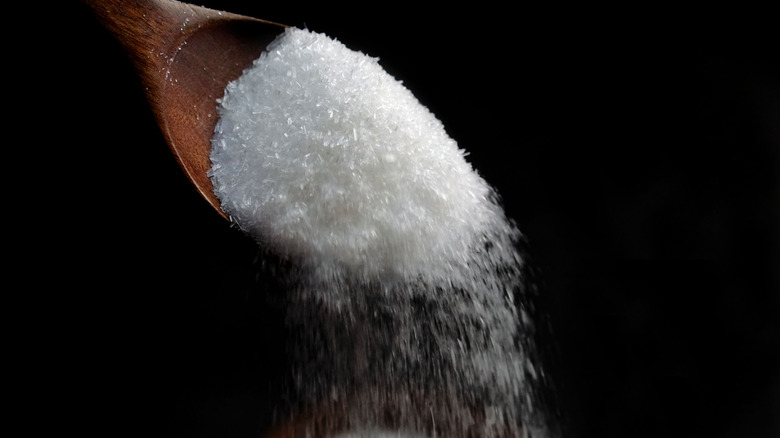Andrew Zimmern's Secret Ingredient For Tasty, Low-Sodium Food
When you need to lower the amount of salt in your diet, you can try a few different tactics. According to the CDC, you can opt to compare sodium levels between different products, grab some fresh protein or vegetables instead of canned or preserved foods, replace salt with other spices or flavors, or even just split a meal with a friend. The National Kidney Foundation also suggests slowly weaning your taste buds off of salt by slowly and incrementally reducing the amount of salt you add into your food. They also recommend keeping an eye out for items that have a high sodium content without explicitly tasting salty.
Even high-caliber chefs have had to face their sodium intake and have developed some particular tricks to help deal with salty food. Andrew Zimmern is no stranger to salt and recently took to Instagram to share some insider secrets. The chef appeared in a post and addressed a question posed by a fan, who wanted to know a cheap way to make healthier food taste good without adding a ton of butter or other ingredients they were trying to avoid. Zimmern had one easy solution that blew the minds of his followers.
Andrew Zimmern's secret ingredient to flavor
Andrew Zimmern recommended one simple ingredient to transform their food on the fly in the Instagram post. He said that home cooks should add MSG to their meals for a pop of flavor without adding too much salt into a dish. He recommends mixing MSG and salt together in a 2:1 ratio, and claims that it also helps remove some of the extra salt from your diet. Followers loved the advice and chimed in with, "So happy the MSG nonsense is finally being debunked," and, "No matter how many times I tell people to add a little msg to meals to pack a punch, I get screamed at ... so good to hear a well known chef say this too!"
Zimmern claims that MSG can't harm you and the FDA agrees, recognizing this ingredient as generally safe for human consumption (via Mayo Clinic). Some have claimed that this ingredient causes headaches, sweating, weakness, and more, but researchers have never been able to correlate these symptoms to MSG. Scientists did note that a very select group of people did have a mild reaction to the ingredient, but didn't require medical attention and the reaction didn't last long.
If you need a flavor boost, take Zimmern's advice to heart, especially if you want a low-sodium way to make food taste that much better.

